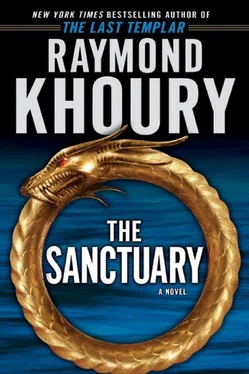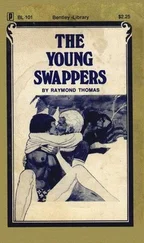Corben shrugged sympathetically, but he didn’t seem convinced. “How well did you know her?”
Maybe it was because she was exhausted and hungry, or maybe it was because there was some remote validity to his insinuation, but Mia didn’t really know what to think anymore.
“She’s my mother,” she shot back regardless.
“You didn’t answer my question.”
Mia frowned. “I’ve only been here for three weeks, alright? I was in Boston before that. So I can’t say we’ve been two peas in a pod, but she’s still my mother and I know what she’s like. I mean, come on. Have you met her? She’s messianic when it comes to archaeology.” She heaved a tired sigh, then added, “She’s a good person.”
A good person. She knew how vacuous that sounded, but, bottom line, she believed it.
“What about your dad? Where is he?”
A distant sadness clouded Mia’s face. “I never knew him. He died shortly after I was born. A car crash. On the road to Jordan.”
Corben glanced at her and nodded, seeming to process her words. “I’m sorry.”
“It’s alright.” She shrugged. “It was a long time ago.”
She stared quietly out her window. People were out in the streets, getting on with the routines of their lives. A pang of envy tugged at her heart. She coveted their insouciance — before remembering that they probably weren’t as carefree as they seemed, given what they’d just been through, and the fragility of the country. She didn’t know what was going on behind their affable façades, and it made her think that maybe when it came right down to it, when it came down to the crisis points that define who people really are, maybe we didn’t really know as much about others as we thought we did. With a twinge of guilt, she found herself wondering if maybe Baumhoff and Corben could possibly be right. She didn’t really know her mother that well. She didn’t know what was really going on in her life. And that was where gut feelings and hard truths could easily diverge.
The car slowed and stopped, caught up in traffic in the narrow, single-lane road. She turned to Corben. “You can’t seriously think she could have been trading in looted relics?”
He met her gaze straight on. “The way I understand it, they were after her specifically, and unless she’s the first in a campaign targeting foreigners, which our intel suggests is highly, highly unlikely, it’s the only angle we have to work with right now.”
Mia’s spirits sank visibly as she digested his words. Corben studied her thoughtfully. “Look, it doesn’t matter why they took her. The fact of the matter is, someone’s got her, someone’s grabbed a woman, an American woman, off the street, and the reason behind it only matters if it’ll help us get her back. ’Cause that’s what we’re after, that’s the endgame. Getting her back. The rest we can deal with later.” A gentle reassurance had crept into his voice.
Mia managed to find a half-smile. Her eyes brightened with his resolve, and she nodded appreciatively.
“I know you’re tired,” he added, “I know you’re probably desperate to get back to your place and jump under a shower and wash the whole experience off, but I really need to talk to you about what happened last night. You were there. What you tell me could be crucial in helping us find her. Time is always against us in these situations. Do you think you can handle that right now?”
“Absolutely.” She nodded.
An acrid, bitter smell speared Evelyn back to consciousness.
She jolted upright, shaking its sting away. Her eyes shot open, only to be assaulted by the fierce neon lighting in the room. It seemed to be coming at her from all sides, as if she were sitting in a white box. She squeezed her eyes back shut.
Slowly, hints of awareness broke through her daze. For one thing, she wasn’t stuffed in the car’s trunk anymore. She was sitting on a hard, metal-framed chair. She tried to shift her position and felt a burning pain from her wrists and ankles. She tried to move them, but couldn’t. She realized she was cuffed into place.
She sensed movement around her, and warily she opened her eyes. Inches from her face, a blurry hand was pulling away. Its fingers held something, a small cylinder of some kind. As she regained her focus, she realized it was a capsule. She thought it must be the smelling salts. She caught a final whiff of it as she followed the hand up. A man was standing there, facing her.
The first thing Evelyn noticed were his eyes. They were an unusual blue, and utterly devoid of any emotion. The word arctic came to mind. They were fixed on her, scanning her with detached curiosity, alert to every twitch in her body.
They never blinked.
She guessed that the man was in his fifties. He had a handsome, distinguished face. His features — the brow, the cheekbones, the chin and nose — were prominent, aquiline, and yet, finely sculpted. His skin was slightly tanned to a rich, golden hue. He sported a full head of undulating, salt-and-pepper hair, which he wore suavely gelled back, and he was tall, easily over six feet. What stood out mostly in her mind, though, was how slim he was. Not in a bulimic, waiflike manner. Just skinny, which his height only accentuated. He clearly looked after himself well and had his appetite on a tight leash and didn’t seem any weaker for it. His posture exuded confidence and influence, and his cold eyes presaged a steely, uncompromising disposition, which she found unsettling.
For some reason, her instincts were telling her he wasn’t Arab. Which was confirmed by his accent, when he finally decided to speak up. Not to her. To someone she hadn’t noticed, behind her.
“Give her some water,” he ordered calmly, in an Arabic that was definitely not indigenous but that, oddly, had an Iraqi tinge to it.
Another man appeared beside her and brought a bottle of cold mineral water up to her mouth. His features were dark and brooding, his eyes dead, like those of the men who’d grabbed her in Beirut. Her captor seemed to have a veritable private goon squad at his disposal. She stored the thought as she gratefully took in a few gulps, before this dark man pulled back and disappeared from view again like a ghost.
The man facing her moved to a low cabinet that ran along the wall and pulled open a drawer. She couldn’t see what he was doing, but she heard what sounded like a plastic packet being ripped open. With rising trepidation, she cast her eyes around the room. It was windowless and painted a harsh, acrylic white, all around. The shiny, white drawer cabinet ran the full length of the wall. The room seemed impeccably kept and meticulously efficient — harshly efficient, Evelyn suddenly thought. A reflection, she realized, of its master.
Several other worrying thoughts abseiled into her mind.
First and foremost was that she wasn’t blindfolded. Her kidnappers in Beirut — well, that was self-evident. They weren’t about to waltz through the crowded downtown arcades in balaclavas. But here…This was different. And this was no hired henchman. This man was clearly in charge. And that he didn’t mind showing her his face did not bode well at all.
Next was his attire. He was wearing a sports shirt and khaki chinos,under a dark blue blazer. That wasn’t the problem. The problem was the white doctor’s coat he wore over them. In the white room. With the long white unit of drawers and cabinets. And with, she now noticed as she glanced up, the kind of stark lighting you normally find in an operating room.
Evelyn swallowed hard.
She didn’t dare look behind her, to the rest of the room, but her mind filled in the surgical equipment that she imagined was lurking behind her back.
Читать дальше












